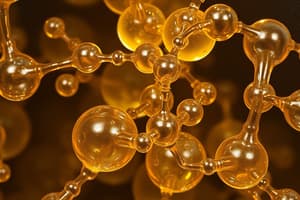Podcast
Questions and Answers
What is the term 'crystallinity' in polymers referring to?
What is the term 'crystallinity' in polymers referring to?
- The molecular weight of the polymer chains
- The degree of structural order within the polymer chains (correct)
- The presence of additives or fillers in the polymer
- The thermal and barrier properties of the polymer
What characterizes the crystalline regions within a polymer material?
What characterizes the crystalline regions within a polymer material?
- Presence of irregular and random polymer chains
- Highly ordered molecular structure and specific geometric arrangement of polymer chains (correct)
- Lack of specific geometric arrangement within the polymer chains
- Loose and unorganized molecular structure
Which factor influences the crystalline structure of polymers?
Which factor influences the crystalline structure of polymers?
- Mechanical, thermal, and barrier properties
- Type of applications in daily lives
- Degree of transparency and color intensity
- Molecular weight, degree of branching, and presence of additives or fillers (correct)
How do longer and more linear polymer chains affect crystallinity?
How do longer and more linear polymer chains affect crystallinity?
What significant impact does the degree of crystallinity have on polymers?
What significant impact does the degree of crystallinity have on polymers?
Which aspect greatly influences the properties of polymers?
Which aspect greatly influences the properties of polymers?
What effect does higher crystallinity have on the mechanical properties of polymers?
What effect does higher crystallinity have on the mechanical properties of polymers?
How do crystalline regions influence the thermal properties of polymers?
How do crystalline regions influence the thermal properties of polymers?
What are the characteristics of polymers with lower crystallinity at room temperature?
What are the characteristics of polymers with lower crystallinity at room temperature?
How do highly crystalline polymers affect their permeability to gases and liquids?
How do highly crystalline polymers affect their permeability to gases and liquids?
What is the primary purpose of X-ray diffraction (XRD) in analyzing polymers?
What is the primary purpose of X-ray diffraction (XRD) in analyzing polymers?
What does Differential scanning calorimetry (DSC) measure in polymers?
What does Differential scanning calorimetry (DSC) measure in polymers?
How is infrared spectroscopy (IR) used to study the crystallinity of polymers?
How is infrared spectroscopy (IR) used to study the crystallinity of polymers?
What insights can be obtained from a DSC thermogram regarding polymers?
What insights can be obtained from a DSC thermogram regarding polymers?
What kind of polymers are suitable for applications requiring a barrier to moisture or gases?
What kind of polymers are suitable for applications requiring a barrier to moisture or gases?
What kind of structural integrity do rigid and ordered crystalline regions provide to polymers?
What kind of structural integrity do rigid and ordered crystalline regions provide to polymers?
What impact does a higher degree of crystallinity have on the mechanical properties of polymers?
What impact does a higher degree of crystallinity have on the mechanical properties of polymers?
Which type of polymer is likely to exhibit greater strength and rigidity due to a high degree of crystallinity?
Which type of polymer is likely to exhibit greater strength and rigidity due to a high degree of crystallinity?
What is the primary role of amorphous regions in a polymer?
What is the primary role of amorphous regions in a polymer?
How do polymers with lower crystallinity generally compare to highly crystalline polymers in terms of impact resistance?
How do polymers with lower crystallinity generally compare to highly crystalline polymers in terms of impact resistance?
What is the effect of increased crystallinity on the thermal properties of polymers?
What is the effect of increased crystallinity on the thermal properties of polymers?
Which factor significantly influences the density of polymers?
Which factor significantly influences the density of polymers?
What factor contributes to the lower densities of polymers with a higher degree of branching?
What factor contributes to the lower densities of polymers with a higher degree of branching?
How does the presence of polar or nonpolar functional groups impact the density of polymers?
How does the presence of polar or nonpolar functional groups impact the density of polymers?
Which analytical technique is used to measure the scattering of X-rays as they interact with the atomic arrangement of polymers?
Which analytical technique is used to measure the scattering of X-rays as they interact with the atomic arrangement of polymers?
What does differential scanning calorimetry (DSC) measure in polymers?
What does differential scanning calorimetry (DSC) measure in polymers?
How can Fourier-transform infrared spectroscopy (FTIR) be utilized to assess the crystallinity of polymers?
How can Fourier-transform infrared spectroscopy (FTIR) be utilized to assess the crystallinity of polymers?
What are high crystallinity polymers, such as polyethylene terephthalate (PET), widely used for?
What are high crystallinity polymers, such as polyethylene terephthalate (PET), widely used for?
How does higher crystallinity affect the density of polymers?
How does higher crystallinity affect the density of polymers?
Which factor directly affects the density of a polymer?
Which factor directly affects the density of a polymer?
How can researchers quantify the degree of crystallinity in polymers?
How can researchers quantify the degree of crystallinity in polymers?
What makes polypropylene (PP) suitable for flexible packaging and containers?
What makes polypropylene (PP) suitable for flexible packaging and containers?
Study Notes
Crystallinity in Polymers
Polymers, commonly known as plastics, are versatile materials with a wide range of applications in our daily lives. One of the key aspects that greatly influences the properties of polymers is their crystallinity. In this article, we will explore the concept of crystallinity in polymers, the crystalline structure, the effect of crystallinity on properties, and methods used to measure crystallinity.
Crystalline Structure
In polymers, the term crystallinity refers to the degree of structural order within the polymer chains. When polymer chains are arranged in a regular and repeating pattern, they form crystalline regions within the material. These crystalline regions are characterized by a highly ordered molecular structure, with the polymer chains aligned in a specific geometric arrangement.
The crystalline structure of polymers is influenced by several factors, including the molecular weight of the polymer chains, the degree of branching, and the presence of additives or fillers. Generally, polymers with longer and more linear chains tend to exhibit a higher degree of crystallinity, as they have a greater tendency to align and pack together in an ordered manner.
Effect of Crystallinity on Properties
The degree of crystallinity in polymers has a significant impact on their mechanical, thermal, and barrier properties. In terms of mechanical properties, polymers with higher crystallinity tend to be stiffer, stronger, and more resistant to deformation. This is due to the presence of the rigid and ordered crystalline regions, which provide structural integrity to the material.
Furthermore, the thermal properties of polymers are also influenced by their crystallinity. Crystalline regions act as physical cross-links within the polymer matrix, leading to higher melting points and greater heat resistance. On the other hand, polymers with lower crystallinity exhibit more amorphous characteristics and tend to have lower melting points and greater flexibility at room temperature.
In addition to mechanical and thermal properties, the barrier properties of polymers, such as permeability to gases and liquids, are influenced by their degree of crystallinity. Highly crystalline polymers often have lower permeability, making them suitable for applications where a barrier to moisture or gases is required.
Methods to Measure Crystallinity
Several techniques are commonly used to measure the crystallinity of polymers, providing valuable insights into the material's structure and properties. X-ray diffraction (XRD) is a widely used method to analyze the crystalline structure of polymers. By exposing a polymer sample to X-rays and measuring the diffraction pattern of the scattered rays, it is possible to determine the degree of crystallinity and the spatial arrangement of polymer chains within the material.
Differential scanning calorimetry (DSC) is another important tool for assessing the crystallinity of polymers. This technique involves subjecting a polymer sample to controlled temperature changes and measuring the heat flow associated with the phase transitions, such as melting or crystallization. From the DSC thermogram, the degree of crystallinity and the corresponding melting enthalpy can be determined, providing valuable information about the material's thermal behavior.
Moreover, infrared spectroscopy (IR) can be utilized to study the crystallinity of polymers by analyzing the molecular vibrations within the material. The presence of specific absorption bands associated with crystalline and amorphous regions allows for the quantitative determination of crystallinity based on the peak intensities and ratios.
In conclusion, the concept of crystallinity plays a crucial role in shaping the properties and performance of polymers. Understanding the crystalline structure, the influence of crystallinity on properties, and the methods to measure crystallinity provides valuable knowledge for the design and engineering of polymer materials for various applications. Whether it's enhancing mechanical strength, improving thermal stability, or optimizing barrier properties, the manipulation of crystallinity in polymers continues to be a focal point of research and development in the field of materials science.
Studying That Suits You
Use AI to generate personalized quizzes and flashcards to suit your learning preferences.
Description
Explore the concept of crystallinity in polymers, including its influence on mechanical, thermal, and barrier properties. Learn about the crystalline structure, factors affecting crystallinity, and methods for measuring it, such as X-ray diffraction and differential scanning calorimetry.




